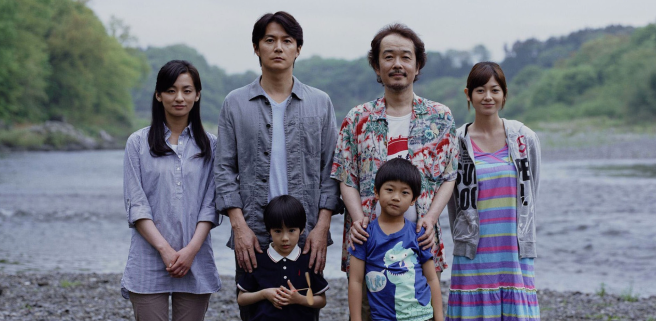Directed by Hirokazu Kore-eda

I have so far seen three Hirokazu Kore-eda films, and they all orbit the relationship between a father and son, none as directly as Like Father, Like Son. In After the Storm we follow a troubled, gambling-addicted private investigator who struggles to maintain a healthy relationship with his son as he continues to grovel to his ex-wife, hoping to get back together. In Shoplifters we’re shown a family forged, and the final moments of the film concern a boy and the closest thing he has to a father. In this film our main character and his wife learn that their six year-old son was switched at birth with another, and this sudden reality brings out the worst in the man has he grapples with the question of what does it mean to be family.
He is Ryoto, his wife is Midori, and their son is Keita. Ryoto is a workaholic, and Midori laments all the time he spends away from her and Keita. He puts pressure on his son to succeed and grumbles when Keita doesn’t show the killer instinct he’s looking for. When Ryoto learns that their biological son is a boy named Ryusei, he mutters, “it make sense,” a line Midori understandably never forgets.
Their biological son is raised by much more emotive parents, Yudai and Yukari. They have other children, they are lower class, and they do everything together from eat to shower. The two sets of parents will meet, and their economic fortunes and personality differences are highlighted immediately. Ryoto doesn’t like that Yudai’s first response is to wonder how much they will receive from the hospital in damages, and when a coworker tells Ryoto that he should fight to keep both boys, well it’s poison that goes straight to the brain.
Him being the wealthier one it’s easy to see why he thinks he could get away with such a thing. The two sets of parents are presented a distressing choice, to keep their children or ‘trade’ them, and Ryoto’s decision to try and keep both highlights his ego as well as the simple truth that he could never give away his son, either one.
Over the course of a few months they introduce the boys to the biological parents and then give them away for a couple nights, like fostering a puppy. Each boy bonds with his biological parents, and then soon before it comes time to make their decision, Ryoto tells Yudai he wants both children, and he’s slapped as a result.
They go through with the switch, mostly because Ryoto has come to believe that blood relation means more than the six years he and Midori have had with Keita. It’s brutal and disturbing, to watch them give their son away, and it makes us empathize all that much more with Yudai and Yukari, even though they’ve made the same decision.
Because this is Ryoto’s story, tracking his arc and how he comes to see his own faults and express proper love for his son, we don’t see every important moment with the other set of parents. They are humanized and fleshed out in their own way, but we don’t see what I think is their ‘ugly’ side, the same side of Ryoto that willingly trades away his son Keita.
The whole story is melodramatic, but it’s also very thoughtful, sincere and poignant. It’s melodramatic only in its premise and from there is expressed with a thoughtfulness that not many movies possess. It’s heartbreaking and heartwarming, and the kids in particular are a wonder.
It may paint in broad strokes at the beginning, of course making sure the two sets of parents are very different, but it doesn’t demonize or idolize one side over the other. Ryoto and Midori aren’t defined by their wealth and lifestyle, and neither are Yudai and Yukari. They express love in different ways and both struggle with this distressing revelation. It keeps them at a distance and yet bonds them as they both go through this turbulence.
In these three Kore-eda films that I’ve seen his paternal figures are usually quite flawed. They’re selfish but eventually loving, and in the case of Shoplifters though that figure (played by Lily Franky who plays Yudai) is much more kind, he is quietly reckless and puts his adopted son in dangerous circumstances. In Like Father, Like Son and After the Storm the father figure reveals his flaws right at the top and then becomes more loving and selfless in the end while in Shoplifters we can sense the selfishness of the father figure though it’s only fully revealed later on, before he’s given a chance at redemption at the very end.
Up Next: Stoker (2013), Meek’s Cutoff (2010), Peppermint Candy (2000)

One of my favourite filmmakers, a brilliant movie. You adumbrated the main points in the film well, thanks!
LikeLike